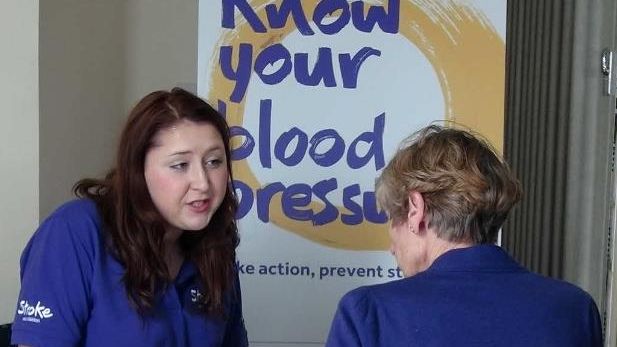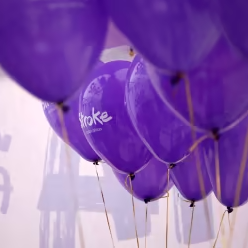
Press release -
UK women unaware of their stroke risk, new poll reveals
One in eight women in the UK wrongly believes that a stroke could never happen to them, according to the findings of a poll published today by The Stroke Association. Around 30,000 women die from a stroke every year (i). The condition is the third leading cause of death in women in the UK, and the second biggest killer worldwide.
The charity’s latest poll (ii), commissioned to mark World Stroke Day on 29 October, uncovers widespread misconceptions about stroke amongst women. The findings, based on a UK-wide survey of 2,000 adults, show that:
- Three quarters of women (74%) did not know that stroke is one of the world’s biggest killers
- Fewer than a third of women (28%) said they thought they would be most likely to have a stroke as they got older.
Nikki Hill, Deputy Director of External Affairs at The Stroke Association, said: “It’s extremely worrying that most women don’t even have stroke on their radar. We know that women’s stroke risk significantly increases as they get older, and one in five women will have a stroke in their lifetime.
“This should serve as a wake-up call to women of all ages to be aware and better informed of the steps they can take to reduce their stroke risk. Simple lifestyle changes, such as keeping blood pressure under control, exercising regularly and stopping smoking, could significantly lower women’s likelihood of having a stroke.”
The research also found that women have different attitudes towards the consequences of stroke compared to men. The findings show that;
- Over half of women (51%) said they feared becoming reliant on others as a result of a stroke, compared to just two fifths of men (44%)
- Memory loss was one of the most feared consequences of a stroke for men, while a greater proportion of women feared losing their ability to speak(iii)
- Just one in 25 women (4%) said they feared losing their ability to walk.
Nikki Hill continued: “Stroke can hit you out of nowhere and rob you of your speech, your ability to walk, your memory, your independence and your dignity. This devastating condition kills three times as many women as breast cancer every year.
“On World Stroke Day (29 October) 2014, we’re urging women everywhere to have a better understanding of their risk factors for stroke. We offer advice, information and support for anyone worried about stroke and its impact. The condition doesn’t have to be inevitable; together we can conquer stroke.”
Moya Greene, Chief Executive of Royal Mail Group, said: “We’re pleased to be supporting World Stroke Day, in aid of our charity partner, the Stroke Association.
“We want to raise awareness of stroke with all of our 148,000 strong workforce. We are pleased to be the first company to highlight the condition to so many employees, based in communities across the
UK.
“In particular, we will be highlighting the increased risk of stroke in women to our female employees. We will do so by holding a number of health road shows at Royal Mail and Parcelforce sites to inform our people of the symptoms associated with the condition and the lifestyle changes they can make to minimise the risk of having a stroke.
“We are also encouraging our customers to fundraise for the Stroke Association and to donate money to support the charity’s vital work. Together with our employees, we aim to raise at least £2 million, which will provide Life After Stroke Grants to 10,000 stroke survivors.”
To mark World Stroke Day, the Stroke Association is launching a new fundraising campaign aimed at raising awareness of the impact of stroke on women. To find out more, and to view information and support available, visit www.stroke.org.uk/women.
Ends
For further information, please contact the Stroke Association’s media team on 020 7566 1500 or email press@stroke.org.uk
Notes to Editors
Facts and figures on women and stroke:
- Each year, more women have strokes than men. Although the risk of stroke in young women is generally low, pregnancy and contraceptive pills are both significant stroke risk factors. Hormone replacement therapy is also linked to a higher risk of stroke.
- Stroke is the third leading cause of death in women in the UK
- One in five women will have a stroke in their lifetime
- Three times as many women die from stroke compared to breast cancer
- 51% of hospital admissions for stroke are female
- 61% of all stroke deaths are female
- Women with a large waist-to-hip ratio have up to thirteen times increased risk of stroke. Black African and Caribbean women have the highest waist-hip ratio
- Over 50% of all UK smokers are female. Smoking doubles the risk of stroke
- Contraceptive pills could double your risk of stroke
(i) Office of National Statistics: Deaths Registered in England and Wales in 2010, by Cause. (2010)
(ii) Opinium Research conducted an online survey of 2,002 UK adults aged 18 and over from 2 – 8 September 2014
(iii) Memory loss was the third most feared consequence of stroke of men surveyed (13%). Losing the ability to speak was the third most feared consequence of stroke of women surveyed (16%)·
Topics
Categories
A stroke is a brain attack which happens when the blood supply to the brain is cut off, caused by a clot or bleeding in the brain. There are around 152,000 strokes in the UK every year and it is the leading cause of severe adult disability. There are over 1.2 million people in the UK living with the effects of stroke.
The Stroke Association works directly with stroke survivors and their families and carers, with health and social care professionals and with scientists and researchers. We campaign to improve stroke care and support people to make the best recovery they can. We fund research to develop new treatments and ways of preventing stroke. Together we can conquer stroke.
The Stroke Helpline (0303 303 3100) provides information and support on stroke. More information can be found at www.stroke.org.uk












